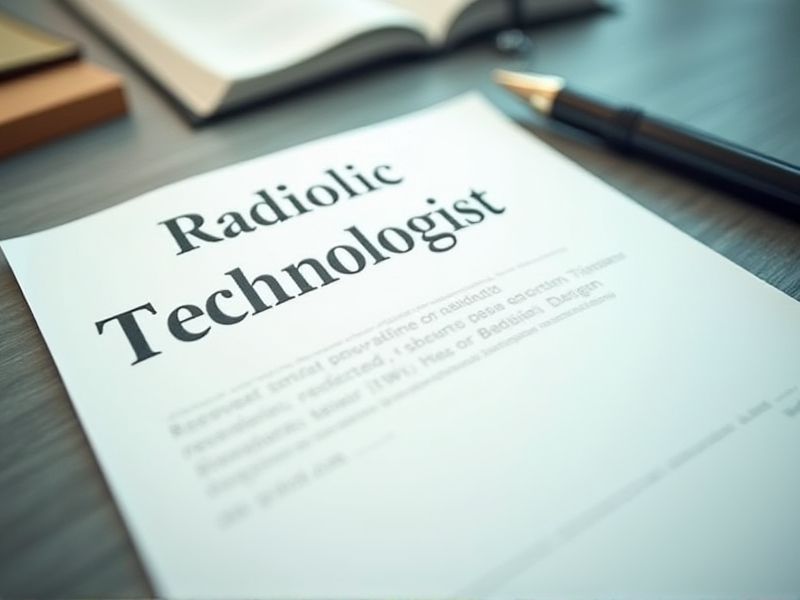
Radiologic technologists operate complex imaging equipment and interact closely with patients, making precision and safety critical. Certifications ensure that technologists possess the necessary skills and knowledge to perform diagnostics accurately while adhering to safety protocols. Regulatory bodies and healthcare institutions require certifications to maintain a standard of practice and to ensure legal compliance. Essential certifications for radiologic technologists include ARRT certification and state-specific licenses.
ARRT Certification in Radiography
ARRT Certification in Radiography ensures that radiologic technologists meet standardized professional qualifications and demonstrate competence in their field. Certification reflects adherence to ethical standards and promotes patient safety by ensuring technologists are knowledgeable about the latest medical imaging protocols. Employers often require ARRT certification as it signifies a level of trust and professionalism, reducing the risk of diagnostic errors. Continuous certification maintenance incentivizes ongoing education, keeping technologists informed about advancements and best practices in radiography.
ARRT Certification in Computed Tomography (CT)
Obtaining ARRT Certification in Computed Tomography (CT) ensures that a radiologic technologist possesses the necessary expertise and knowledge to operate CT equipment effectively. This certification enhances a technologist's credibility and job prospects, as many employers prefer or require it for specialized imaging roles. ARRT Certification promotes adherence to safety protocols, thereby reducing exposure to radiation for both patients and medical staff. Continuous education requirements associated with the certification help technologists stay updated with the latest advancements in the field.
ARRT Certification in Magnetic Resonance Imaging (MRI)
Earning ARRT certification in MRI enhances a radiologic technologist's knowledge and skills in operating complex MRI equipment, ensuring accurate diagnostic imaging. Certification often leads to increased job opportunities, as employers tend to prefer candidates who meet rigorous professional standards. Maintaining ARRT certification requires continuous education, which helps technologists stay current with technological advancements and best practices in MRI. Certification acts as a formal recognition of competency, potentially leading to higher salary prospects due to the established expertise.
ARRT Certification in Nuclear Medicine Technology
ARRT Certification in Nuclear Medicine Technology ensures that a Radiologic Technologist meets established standards of professional competence. It enhances job prospects because many employers prefer or require certified technologists. The certification process encourages continuous education, keeping technologists updated with technological and procedural advancements in nuclear medicine. Holding an ARRT certification often leads to better compensation packages, reflecting the technologists' verified expertise.
ARRT Certification in Mammography
Achieving ARRT Certification in Mammography ensures radiologic technologists maintain a high standard of knowledge and skills specific to breast imaging, which is crucial for accurate diagnosis. Certification often leads to adherence to current industry guidelines, meeting regulatory standards that enhance the safety and quality of patient care. The certification can differentiate technologists in a competitive field, often resulting in better job prospects and increased salary potential. Hospitals and clinics may require this certification to meet accreditation standards, thereby fostering trust among patients and healthcare providers.
ARRT Certification in Bone Densitometry
ARRT Certification in Bone Densitometry elevates the technologist's expertise in accurately assessing bone health. It provides a standardized benchmark, ensuring consistent quality and safety in performing bone density exams. The certification enhances job prospects by demonstrating proficiency in a specialized area of radiologic technology. Employers and patients gain confidence from knowing the technologist is up-to-date with industry standards and advancements.
State Radiologic Technologist License
Obtaining a State Radiologic Technologist License ensures that professionals adhere to the necessary safety and ethical standards, protecting patients from excessive or misused radiation. The license serves as a validation of the technologist's skills and knowledge, confirming they meet the state's educational and training requirements. With a license, radiologic technologists gain access to regulated job markets, increasing their employment opportunities and potential earnings. State-regulation through licensing helps maintain uniformity and quality in radiological practices across medical institutions.
Basic Life Support (BLS) Certification
Possessing a Basic Life Support (BLS) certification equips radiologic technologists with essential skills to effectively respond in emergencies, such as cardiac arrest, that can occur unexpectedly in clinical settings. Hospitals and healthcare facilities often require BLS certification to ensure all staff can contribute to patient safety and care continuity during critical situations. Certification enhances a technologist's professional credibility, demonstrating commitment to patient care standards. It also aligns with regulatory requirements that prioritize comprehensive emergency preparedness in medical environments.
Advanced Cardiac Life Support (ACLS) Certification
Advanced Cardiac Life Support (ACLS) Certification is crucial for radiologic technologists because it equips them with the skills needed to manage acute cardiac emergencies that may arise during imaging procedures. When patients have adverse reactions to contrast media, rapid intervention becomes essential, and having ACLS certification ensures technologists can respond effectively. The presence of ACLS-certified personnel in a medical imaging setting tends to enhance patient safety and outcomes, especially in high-risk diagnostic or interventional procedures. Hospitals and imaging centers frequently require ACLS certification for radiologic technologists to ensure compliance with regulatory and accreditation standards, promoting a comprehensive approach to patient care.
Radiation Safety Officer (RSO) Certification
Radiologic technologists work with ionizing radiation, which poses potential health risks to both operators and patients without proper safeguards. RSO certification equips technologists with the knowledge to implement and oversee safety protocols, reducing the likelihood of radiation overexposure. Certification ensures compliance with regulatory standards set by health and safety agencies, preventing legal repercussions and safeguarding institutional integrity. The specialized training enhances workplace safety culture, instills public trust in radiologic services, and assures that patient care meets high standards of safety.
Summary
With additional certifications, you can enhance your diagnostic skills and broaden your technical expertise, leading to more precise imaging and improved patient outcomes. Specialized certifications often make you more attractive to employers, potentially increasing job opportunities and career advancement. As a certified Radiologic Technologist, you may see salary increases due to your expanded qualifications and expertise. Certifications also contribute to personal and professional growth, ensuring you remain current with evolving medical technologies.
